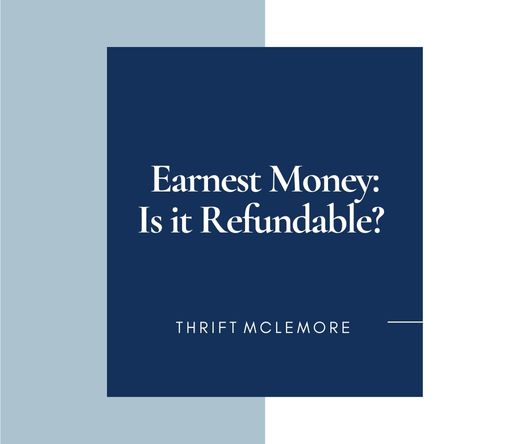Due to the real estate market surge, sellers began requiring more assurances from buyers. One such assurance is earnest money.
How earnest money benefits each party
Earnest money is a deposit to the seller representing the buyer’s good faith in purchasing a new home. It incentivizes the seller to take the house off the market and still have a contingency if the buyer backs out.
Earnest money gives the buyer time to receive financing and run a title check on the property without worrying about another prospective buyer.
How it works
The earnest money gets deposited into an escrow account managed by a third-party broker until the deal is closed.
Typically, the earnest money is put down when the contract to purchase the home is signed. This initial contract does not obligate the buyer to purchase the home because issues may arise during the inspection; the earnest money acts as the buyer’s good faith intention to go through with the sale.
Before the pandemic and the real estate boom, the typical earnest money deposit would be around 1% to 2% of the sale price. Due to the hot housing market in Georgia, earnest money deposits have been trending between 5% and 10% of the property’s sale price. As a buyer, you will want to be sure to put enough money down that your offer is competitive but be cautious of putting more down than necessary, as you might not get that money back.
How to protect yourself
A common issue we have been seeing is buyers being unable to be refunded their earnest money.
In most situations, as long as the buyer acts in good faith, the earnest money is refundable. However, whether your earnest money deposit is refundable depends on the terms of the contract.
A buyer will want a written contract that includes three contingency clauses: (1) appraisal contingency, (2) inspection contingency, and (3) financing contingency.
An appraisal contingency clause allows a return of the buyer’s earnest money if the property is appraised for a lower value than the agreed-upon selling price.
An inspection contingency clause makes the purchase of the home contingent on the outcome of a home inspection. It usually covers how long the buyer has to conduct an inspection and respond to any issues that arise from it.
A financing contingency clause expresses that the offer is contingent on securing financing for the house. A buyer uses this clause to establish an agreed-upon period to apply for a mortgage or close on the loan.
The real estate attorneys at Thrift McLemore are here to help
For more information or if you need assistance with retaining an earnest money deposit, our attorneys at Thrift McLemore will be happy to assist you.







